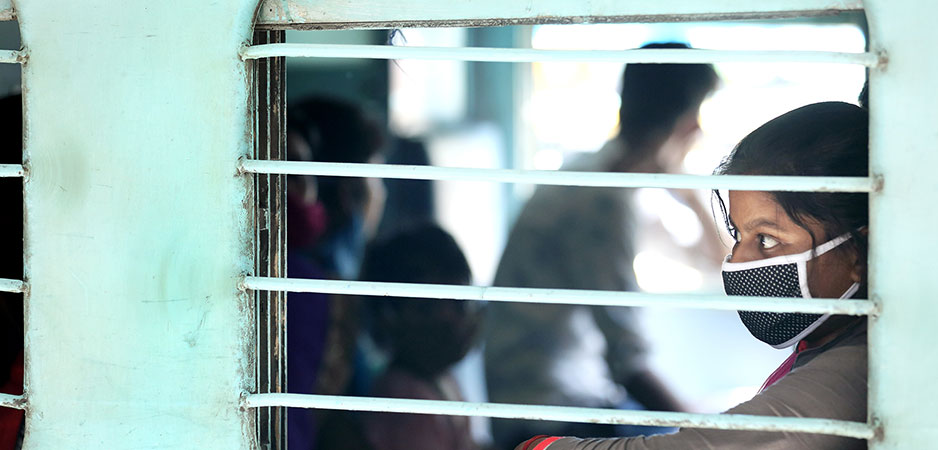
As the COVID-19 pandemic rages on, health-care systems around the world are left strained. The outbreak continues to throttle the efficiency of many health-care sectors, pushing some to the brink. While deficiencies within public health systems are exposed, other viral enemies have come to the fore — racism, bigotry and xenophobia.
The spike in discrimination cases during the COVID-19 pandemic is derived from the process of “othering.” This is described as the conscious or unconscious negative framing of a group of people that is perceived to threaten another group’s existence. “Othering” marginalizes sectors of the population along dimensions such as race, ethnicity, skin tone, religion, gender or class. By labeling a selected group of people as the “other,” the survival of the “imaginary” superior community is protected. It provides a fertile environment for dominant groups to exercise “othering” to affirm their identity and stigmatize less powerful groups.
Finding the Other
This process has been taking place throughout the current pandemic. Since its appearance in Wuhan, China, at the end of last year, the novel coronavirus has unleashed a wave of biased maneuvers against minorities. In the United States, East Asian and Southeast Asian communities have been subjected to virulent and hateful racial abuse ranging from verbal harassment to physical assault. Anti-Asian sentiments have been expressed even more freely online. According to Al Jazeera, more than 10,000 Twitter posts included the term kung flu — a derogatory, racialized descriptor — in March alone. Consequently, 1,497 discrimination complaints were filed to the Asian American and Pacific Islanders Hate Centre in the first month since the initiative launched in March.
In India, the COVID-19 pandemic provided an opportunity to appropriate the virus and justify Islamophobic attacks on Muslim minority groups along religious lines. The mistreatment began when news emerged in New Delhi of an outbreak linked to a Tablighi Jamaat congregation. According to the Health Ministry, by mid-April, 30% of India’s COVID-19 cases were linked to this gathering, contributing to the impression that the religious movement was the main culprit and that Muslims were potential virus carriers. Relatively lesser attention was drawn to other mass gatherings that also resulted in coronavirus infections.
Consequently, many Muslims in India now live in fear. In the village of Harewali, a 22-year-old Muslim man returning from a Tablighi Jamaat conference in Bhopal was beaten for allegedly spreading COVID-19. On Twitter, the #CoronaJihad hashtag was used to portray the virus as a political tool used by Muslims to wage an Islamic holy war in India. Though India’s Prime Minister Narendra Modi issued a statement in an attempt to calm the situation, discrimination still persists nationwide.
Elsewhere, prejudice on the basis of citizenship is on the rise. In Southeast Asia — where over 6.5 million migrants flock to Malaysia, Singapore and Thailand — migrant workers remain trapped and vulnerable to both COVID-19 infections and xenophobia in their host countries. Due to transmission control measures, the livelihoods of migrant workers have been significantly disrupted as their mobility becomes restricted.
In Malaysia, a movement control order (MCO) was imposed to combat the rise in infections. Although a rational move to safeguard public health, the MCO has simultaneously allowed employers to lay off migrant workers, removing them from the stream of income they require to access essential goods and sustain family members in other countries that are also impacted by the crisis. Even with legal and fiscal protections designed to protect small local businesses and the welfare of low-wage workers, Malaysia’s non-citizen workforce remains neglected on the periphery.
Ripple Effect
Thus far, national responses to the health crisis, or even to other crises of similar and lesser degrees, have not prioritized anti-discrimination measures. Despite efforts taken to tackle bias during previous crises, American federal agencies such as the Centers for Disease Control and Prevention or the Department of Justice have been less responsive during the COVID-19 outbreak. Meanwhile, given India’s history of tensions when it comes to its Muslim minority, little progress has been made to curb hate crimes besides issuing statements espousing fairness and equality.
In the Asia Pacific, government measures have produced unintended hostility against migrant workers. Citizens in the region have turned toward stereotyping the “poor hygiene” of migrant workers as a reason for the continued transmission of COVID-19. This xenophobic rhetoric is further intensified by government-led raids and detentions of those migrants who are forced to work illegally despite the lockdown.
These instances of discrimination are the ripple effect of COVID-19. The mystery surrounding this highly infectious virus also activates the fears and anxieties people have toward those seen as being “different.” Because of the unknown nature of the virus and its unprecedented impacts, people have engaged in “othering” as a means of self-preservation or to better make sense of the crisis. It is neither the color of one’s skin, nor one’s religious affiliation or nationality that is the issue; rather, these attributes have been made more visible by the virus, becoming targets for those anxious about their own safety from COVID-19.
Anti-Asian, Islamophobic and xenophobic prejudice and discrimination need not occur when the world is already facing great challenges in the fight against COVID-19. Indeed, political leaders and the media play important roles in the narratives they perpetuate. However, people also hold equal responsibility in de-escalating these incidents by resisting the compulsion to succumb to fear, anxiety, anger and hate, and should instead move forward with empathy and compassion. Collective solidarity is the panacea we need during this viral pandemic.
The views expressed in this article are the author’s own and do not necessarily reflect Fair Observer’s editorial policy.



